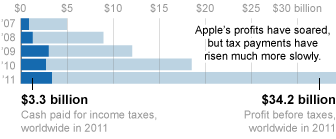Google’s harvesting of e-mails, passwords and other sensitive personal information from unsuspecting households in the United States and around the world was neither a mistake nor the work of a rogue engineer, as the company long maintained, but a program that supervisors knew about, according to new details from the full text of a regulatory report.
The report, prepared by the Federal Communications Commission after a 17-month investigation of Google’s Street View project, was released, heavily redacted, two weeks ago. Although it found that Google had not violated any laws, the agency said Google had obstructed the inquiry and fined the company $25,000.
On Saturday, Google released a version of the report with only employees’ names redacted.
The full version draws a portrait of a company where an engineer can easily embark on a project to gather personal e-mails and Web searches of potentially hundreds of millions of people as part of his or her unscheduled work time, and where privacy concerns are shrugged off.
The so-called payload data was secretly collected between 2007 and 2010 as part of Street View, a project to photograph streetscapes over much of the civilized world. When the program was being designed, the report says, it included the following “to do” item: “Discuss privacy considerations with Product Counsel.”
“That never occurred,” the report says.
Google says the data collection was legal. But when regulators asked to see what had been collected, Google refused, the report says, saying it might break privacy and wiretapping laws if it shared the material. (…)
Ever since information about the secret data collection first began to emerge two years ago, Google has portrayed it as the mistakes of an unauthorized engineer operating on his own and stressed that the data was never used in any Google product.
The report, quoting the engineer’s original proposal, gives a somewhat different impression. The data, the engineer wrote, would “be analyzed offline for use in other initiatives.” Google says this was never done. (…)
The Street View program used special cars outfitted with cameras. Google first said it was just photographing streets and did not disclose that it was collecting Internet communications called payload data, transmitted over Wi-Fi networks, until May 2010, when it was confronted by German regulators.
Eventually, it was forced to reveal that the information it had collected could include the full text of e-mails, sites visited and other data.
{ NY Times | Continue reading }






















